Africa Esports Growth: Trends, Drivers, and Future Opportunities
Updated On: November 20, 2025 by Aaron Connolly
Key Factors Powering Africa Esports Growth
Africa’s esports scene is exploding, and it’s not just one thing driving it. Young people across the continent have really taken to digital tech, and cheap smartphones have made gaming something millions can actually join in on, especially in the cities.
Youth Demographics and Digital Adoption
Africa’s got the world’s youngest population. Over 60% of its people are under 25.
This huge youth wave grew up with smartphones and the internet, so they’re pretty much born gamers.
Mobile gaming rules here. More than 95% of gamers play on their phones instead of pricey consoles or PCs.
Games like PUBG Mobile and FIFA Mobile don’t need fancy hardware. That’s a big deal when you’re looking to get in without breaking the bank.
Mobile money systems have made things even easier. Now, players can pay tournament fees or get prize money without needing a bank account.
Digital literacy keeps climbing as internet coverage gets better. Kenya and Rwanda have even rolled out 5G, and Nigeria’s got over 100 million people online.
Gamers all over Africa watch big tournaments on YouTube and Twitch. Seeing pros compete inspires locals to give esports a real shot and even consider it as a career.
Affordable Mobile Devices and Internet Access
Smartphone prices have dropped fast in Africa. You can get a decent gaming phone for under $100 now.
Data is getting cheaper too, since telecoms are fighting for customers. Some even offer special gaming data bundles that make sure your game traffic gets priority.
Internet access hit 43% in 2024, up from just 16% back in 2015. In cities like Lagos, Johannesburg, and Nairobi, it’s closer to 70%.
Mobile money has knocked down old banking barriers. People use M-Pesa and similar platforms to buy game credits or pay fees—no bank needed.
Chinese and Indian phone brands are everywhere. They offer good devices at prices that make sense for most people.
Local stores even have payment plans, so upgrading isn’t out of reach.
Role of Urban Gaming Hubs
Big cities in Africa are buzzing with esports activity. South Africa, Nigeria, and Kenya are out front, with gaming centres and regular tournaments.
Gaming cafés and lounges give players fast internet and real gaming setups, which is huge if your home connection isn’t great.
These places often run weekend tournaments and training sessions. They’re basically the heart of the local scene.
Cities like Cape Town and Lagos now have esports academies. These places teach not just gaming, but also broadcasting, coaching, and event management.
Local tournaments are popping up everywhere in cities. Events like the Carry1st Africa Cup and African Esports Championship help players move up to the international stage.
Universities in big cities now offer esports programmes and even scholarships.
Students can study game design or digital marketing while playing on varsity teams.
Urban centres attract sponsors, media, and tech businesses. These create esports ecosystems that pull in talent from rural areas and open up career paths beyond just playing.
Major Markets and Hotspots in African Esports
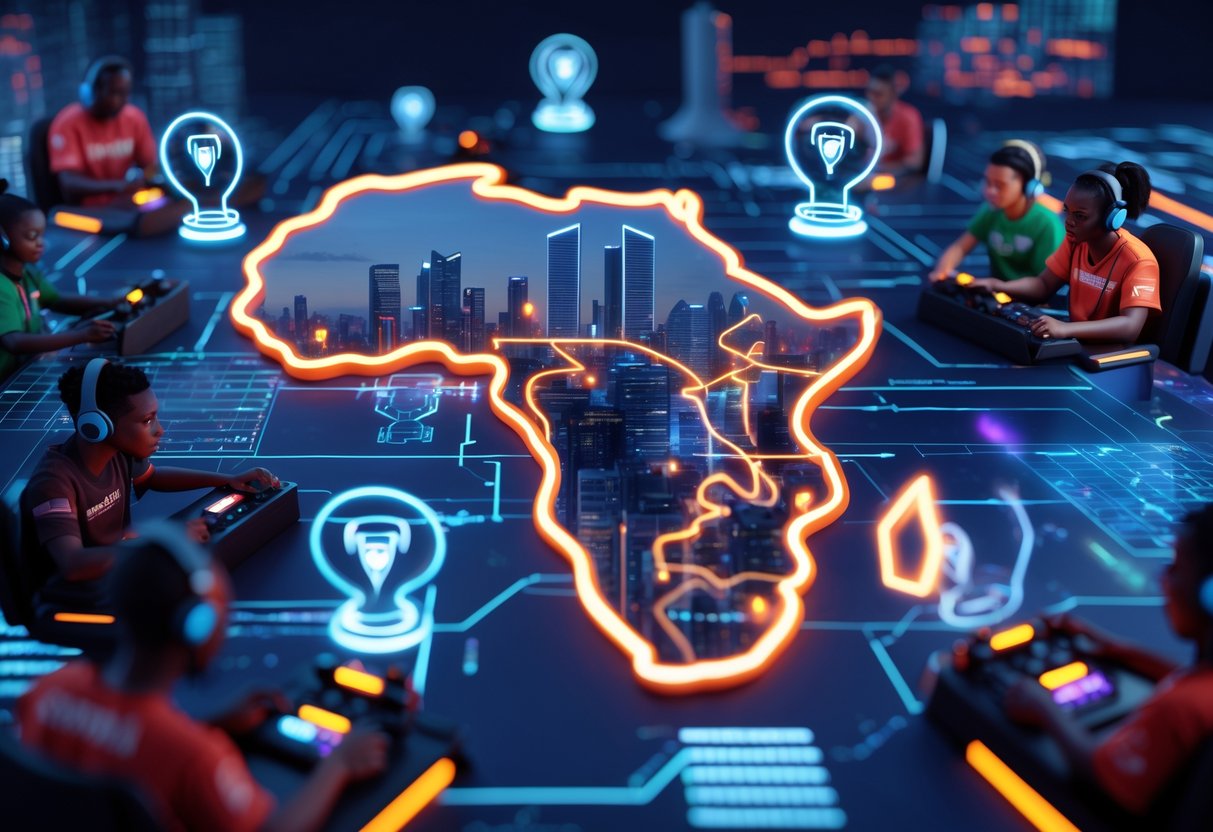
South Africa leads the way with pro tournaments and better infrastructure. Nigeria’s massive urban gaming communities are pushing growth, while Kenya is all about building from the grassroots up.
South Africa’s Professional Scene
South Africa has the most developed esports market in Africa. In 2024, the country pulled in around £170 million from gaming.
Infrastructure and Events
Cape Town and Johannesburg have become huge gaming hubs. They host big tournaments and conventions all year.
Comic Con Africa draws in 70,000 visitors every year. It’s one of the biggest gaming events on the continent, with both international and local esports matches.
Professional Development
South Africa’s strong internet infrastructure lets players compete online without too much lag. Local studios like Nyamakop and Free Lives are making original games, helping put South Africa on the map creatively.
But there are some headaches—high import taxes on gaming gear and tough competition from global markets make things tricky.
Nigeria’s Urban Communities
Nigeria has turned into Africa’s mobile gaming hotspot. The country’s gaming revenue hit nearly £180 million in 2024.
Population and Growth
Nigeria’s huge population is fueling esports growth. Cities like Lagos and Abuja are leading the way.
Most gamers here start out on mobile games since smartphones are so common.
Local Development
Local studios like Maliyo Games team up with international companies to make games that really fit African tastes.
Kucheza Gaming runs youth programmes to build interest in competitive gaming from the ground up.
Challenges and Solutions
High data costs still get in the way for a lot of people. Payment systems for buying games or credits need work.
Training programmes for local developers are starting to help. With more government support, the industry could really take off.
Kenya’s Grassroots Initiatives
Kenya’s esports scene is all about community. The country’s iGaming market went over £60 million in 2024.
Mobile Money Integration
M-Pesa makes it super easy to pay for games or join tournaments. Gamers don’t need a bank account, just their phone.
Players can buy in-game stuff or pay entry fees without any hassle.
Community Building
Local developers are making educational games that mix fun with learning and social issues.
Partnerships like Safaricom x Gameloft are bringing high-quality gaming experiences to Kenyan players.
Content Creation
YouTube and Twitch are taking off for Kenyan gamers. Streamers are building their audiences with live play and esports commentary.
Getting funding is still tough, but there’s a lot of creative energy and excitement in the community.
The African Gamers’ Journey
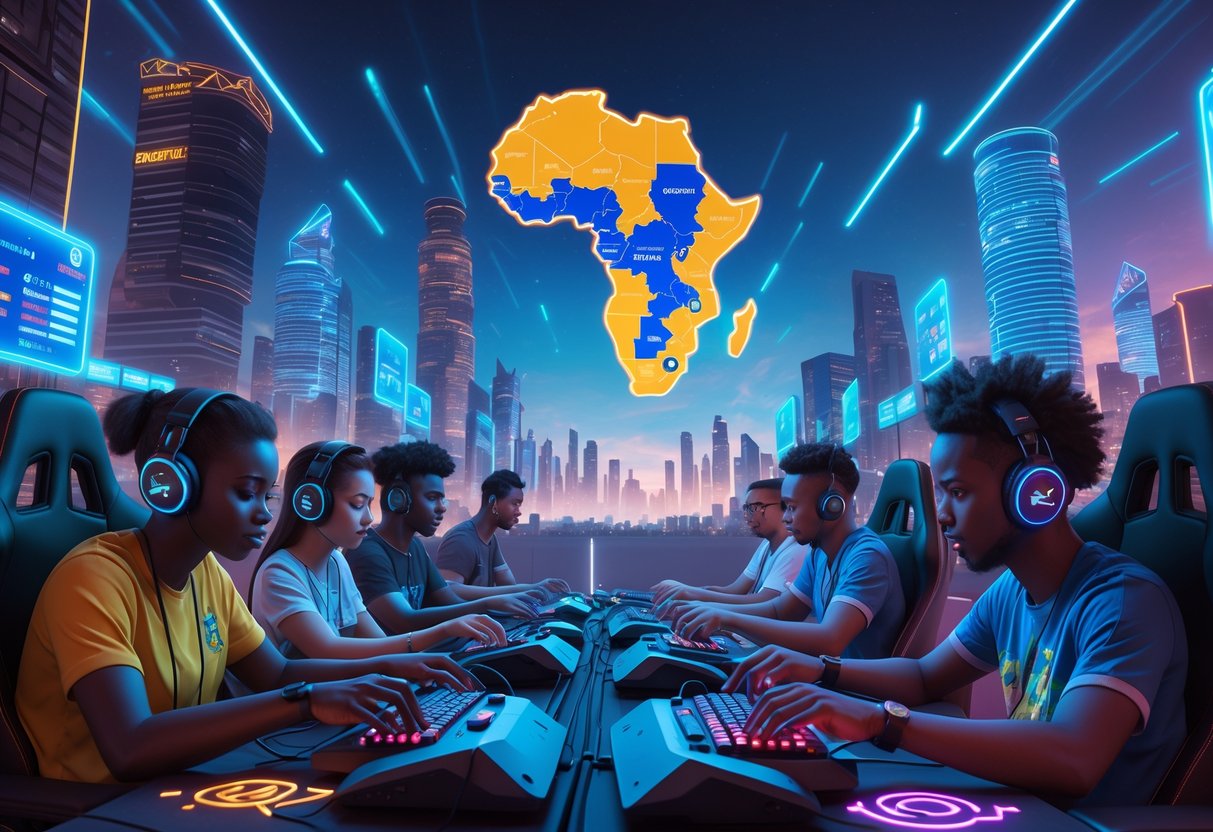
African gamers are building their own communities and finding paths to pro esports careers through streaming, mentorship, and local competitions. Women are leading the way in places like Kenya and South Africa, showing everyone that pro gaming is a real option here.
Community Building and Mentorship
African gamers have built their esports world from scratch. They didn’t wait for big companies—they leaned on each other and grew through grassroots networks.
Local gaming cafés act as training grounds. Players meet up, practice, share tips, and help newcomers get better.
Women like Sylvia Gathoni (QueenArrow) from Kenya have become icons. She’s the first Kenyan esports athlete to make Forbes’ 30 Under 30, and her story inspires other women to join the scene.
Gaming groups like Gamecon Africa run training sessions. They pair experienced players with newbies, speeding up the learning curve.
Quick win: Jump into local Discord servers or Facebook groups to find mentors or teammates nearby.
Rise of Competitive Streamers
African streamers have flocked to Twitch and YouTube. They stream their games, chat with viewers, and build up their own fanbases.
Mobile gaming has fueled this, since titles like Free Fire and Mobile Legends run on almost any smartphone.
Streaming brings in money from:
- Tips and donations from viewers
- Brand partnerships with gaming companies
- Tournament winnings shown live
- Teaching others with game guides
Content creation has turned into a launchpad for pro careers. Teams and organisers often notice the best streamers and invite them to bigger events.
Pathways to Professional Careers
Pro gaming in Africa isn’t just about playing. There are new jobs in:
- Broadcasting and commentary
- Running tournaments and events
- Game development and testing
- Social media and content creation
Esports academies and training centres teach both game skills and business basics, like contracts and personal branding.
Heads up: Some coaching programmes charge a lot but don’t deliver much. Always check reviews before signing up.
Big tournaments in South Africa, Nigeria, and Kenya now have prize pools that can actually support players. Winning local events can open doors to regional and even international competitions.
Professional teams are popping up across Africa. They offer salaries, training facilities, and coaching, so players don’t have to rely only on prize money anymore.
Popular Esports Titles Driving Engagement
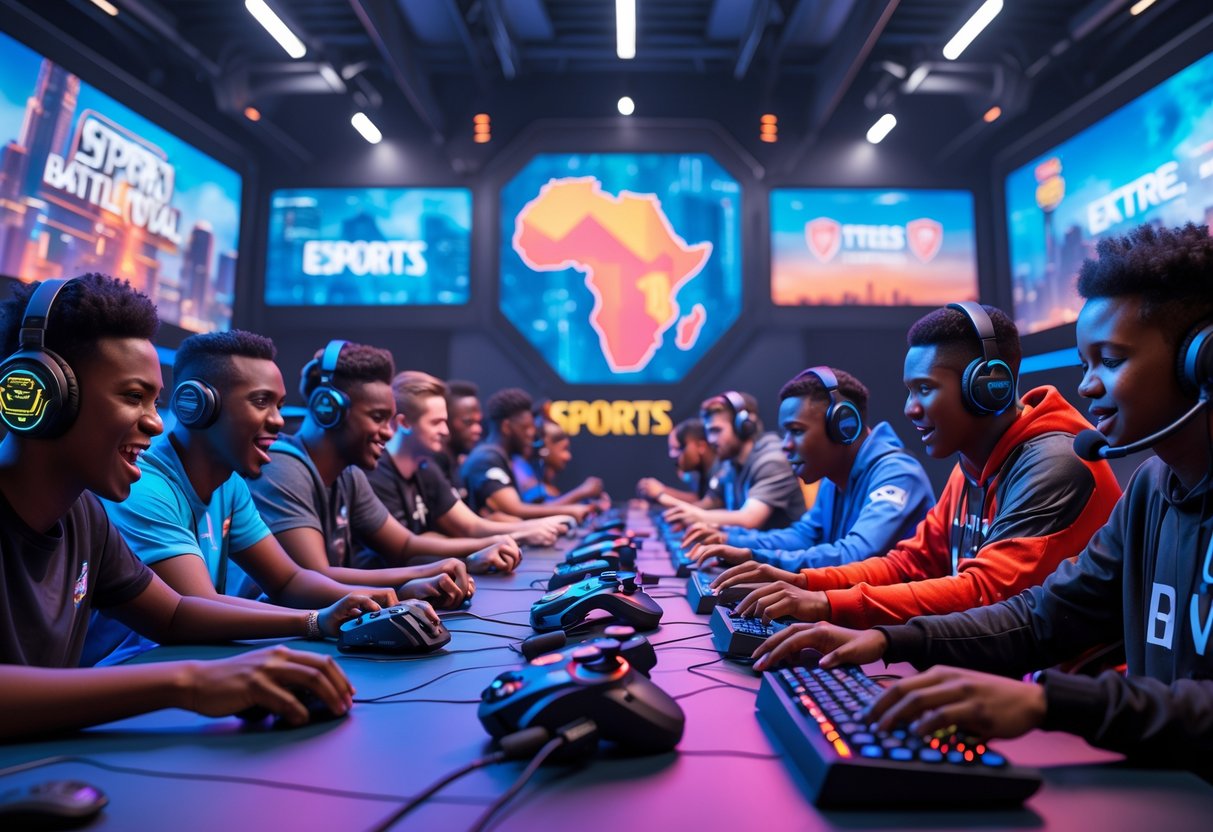
Football games are still king, but battle royale and shooter titles are drawing massive crowds for both mobile and PC tournaments.
FIFA and Football Simulators
FIFA is the top dog in African esports. It fits right in with the continent’s love for football.
Local tournaments often pack out venues, and the fans know every move and tactic by heart.
EA Sports FC (the new FIFA) tournaments run in most big cities. Prize pools range from $500 at small events to $50,000 at regionals.
South African events alone see over 10,000 participants every year.
Mobile football games like eFootball and Dream League Soccer are also huge. They run well on budget phones, and organisers say about 40% of players use mobiles instead of consoles.
Why these games work:
- They connect to real football culture
- Mobile versions need less hardware
- Easy for fans to watch and follow
- Regular updates keep things fresh
It’s not unusual for gamers to watch a Premier League match, then jump straight into a FIFA tournament that same night.
Battle Royale and Shooter Success
PUBG Mobile and Free Fire rule the battle royale scene. They run on cheap Android phones, so pretty much anyone can play.
Free Fire tournaments often pull in over 50,000 live viewers on African streaming sites.
Call of Duty Mobile is another big one. It mixes classic shooter gameplay with mobile convenience, and monthly tournaments in Nigeria and Kenya offer $5,000–15,000 prize pools.
Top titles for tournaments:
- Free Fire (mobile esports)
- PUBG Mobile (especially in cities)
- Call of Duty Mobile (growing fast)
- Valorant (gaining ground on PC)
Quick win: Mobile shooters work better with local internet conditions than heavy PC games, so African players tend to excel here.
Players often start with free mobile games and level up to better devices as they get more competitive.
Infrastructure and Technology Developments
Tech upgrades are changing the esports landscape across Africa. Faster internet, modern gaming gear, and dedicated spaces are making competition more accessible than ever.
Internet Connectivity and Data Costs
Internet speeds have jumped forward in most major African cities. Nigeria, South Africa, and Morocco now run 4G networks that actually support online gaming. In some spots, they’re even testing out 5G technology to cut lag during matches.
Fibre-optic cables reach more urban areas every year. Johannesburg and Cape Town in South Africa have broadband that honestly rivals what you’d get in Europe or the US. Lagos and Abuja in Nigeria are expanding their networks at a rapid pace.
Data costs still make life tough for many players. Mobile data packages can really eat into your wallet if you game often. Lately, though, telecom companies have started to roll out gaming-specific packages with better rates for esports fans.
Key improvements include:
- 4G coverage reaching smaller towns
- Fibre installations popping up in gaming hotspots
- Special data deals aimed at competitive gamers
- Governments putting money into digital infrastructure
Upgrading Gaming Equipment
Gaming hardware is finally getting more affordable in Africa. Mobile gaming leads the way since smartphones cost a lot less than gaming PCs. Big titles like PUBG Mobile and Call of Duty Mobile run smoothly even on mid-range phones.
Gaming PCs and consoles still cost a lot, but you can actually find them now. Import fees keep high-end gear expensive, so most folks start simple and upgrade when they can.
Local suppliers keep expanding their catalogs. Gaming shops in big cities stock keyboards, mice, and headsets built for competition. Online stores deliver gear to more places than ever before.
Equipment trends show:
- Mobile gaming absolutely dominates
- PC gaming’s picking up in cities
- Console gaming’s huge in South Africa
- Second-hand markets help budget-conscious players
Emergence of Gaming Lounges
Gaming centres are springing up in cities all over Africa. These spots offer fast internet and solid gaming rigs for an hourly fee. Players get to practice on pro setups without spending a fortune.
Esports arenas host big tournaments and events. South Africa leads with places like The Lan House in Cape Town. Lagos in Nigeria has gaming centres that run regular local competitions.
Gaming lounges serve all kinds of communities. Some attract casual gamers who just want to try something new. Others focus on hardcore competitors who need top-tier equipment for practice.
Popular gaming hub features:
- Fast internet connections
- Gaming PCs and consoles
- Spaces for hosting tournaments
- Coaching and training sessions
- Community leagues and events
These venues give players access to gear they might never afford on their own. They also build local esports communities where people can meet up and compete regularly.
Investment, Sponsorship, and Economic Growth
Investment is pouring into African esports. Media companies are snapping up broadcasting rights, global brands are sponsoring local tournaments, and venture capital is fueling gaming start-ups. This money is building jobs and the infrastructure that esports needs to grow.
Media Rights and Revenue Expansion
TV networks and streaming services are paying real money for exclusive rights to African esports tournaments. Major broadcasters like MultiChoice are betting on local gaming content to hook younger viewers.
Streaming Revenue Growth:
- Twitch viewership from African streamers jumped 45% in 2024
- YouTube Gaming doubled its partnerships with African creators
- Afrigaming, a local platform, secured £2.3 million in Series A funding
Media companies see that African esports fans are super engaged. Viewers watch tournaments longer than they do traditional sports, giving advertisers prime time during peak gaming hours.
International streaming giants have started opening African offices to get closer to the local scene. Netflix even announced plans for esports documentaries featuring African teams and players.
Corporate and Brand Sponsorships
Global brands are teaming up with African esports teams and tournaments to connect with young consumers. Companies like Coca-Cola, MTN, and Vodacom have signed multi-year sponsorship deals worth millions.
Major Sponsorship Categories:
- Telecommunications: MTN backs League of Legends tournaments in Nigeria and Ghana
- Energy Drinks: Red Bull funds gaming cafés in Johannesburg and Lagos
- Technology: HP and Intel supply hardware for tournaments
- Banking: Standard Bank partners with local gaming groups
These sponsorships give steady income to pro teams. Players can now earn a living wage through contracts, not just prize money. Team houses and training facilities are popping up in more cities.
Local businesses are getting involved too. South African retailer Game stores sponsor community tournaments that help scout new talent for pro teams.
Financial Backing for Start-ups
Venture capital firms are putting record amounts into African gaming start-ups. Companies working on tournament platforms, player management, and gaming hardware raised over £45 million in just two years.
Key Investment Areas:
- Platforms for tournaments and management tools
- Gaming café franchises and equipment rentals
- Player training academies and coaching
- Mobile gaming solutions tailored for Africa
Lagos-based Carry1st raised £15 million to create mobile games for African audiences. Cape Town’s Mettlestate got £3.2 million to grow their esports tournament platform continent-wide.
These investments open up jobs way beyond just playing games. Developers, event managers, and marketing pros are finding new career paths in gaming.
International investors are especially interested in mobile gaming. With more people getting smartphones across Africa, mobile esports looks like the biggest growth area for the next five years.
Local and Regional Esports Tournaments
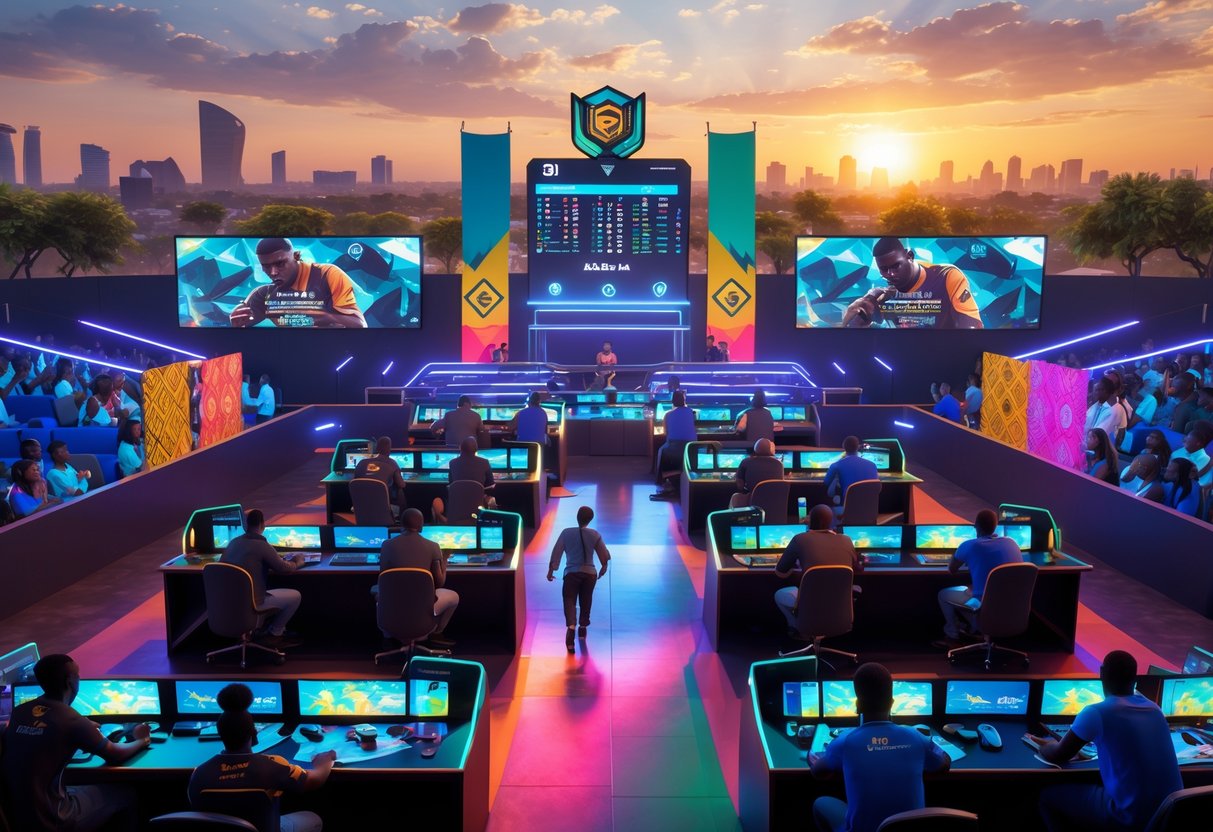
African esports tournaments now offer competition at every level. Events range from big continental championships to school leagues and local meetups.
Africa Esports Championship
The African Esports Championship stands as the continent’s top competitive event. This tournament gathers top teams and players from all over Africa to battle in major games.
Championships usually feature games like League of Legends, FIFA, Dota 2, and CS. These events have big prize pools that attract serious talent.
The format generally includes:
- Regional qualifiers in different countries
- Semi-final rounds for the best teams
- Grand finals streamed on multiple platforms
African gamers use these tournaments to show their skills on a big stage. Many go on to compete globally after strong performances here.
Prize money ranges from $5,000 to $50,000, depending on the game. Registration fees stay low so teams from anywhere can enter.
School and University Leagues
Educational esports leagues are booming across Africa. Universities in South Africa, Nigeria, and Kenya now run regular gaming competitions.
These leagues offer students:
- Teamwork and strategy skill-building
- Scholarship chances for top players
- Career introductions to the esports industry
Most university tournaments stick to easy-to-access games like FIFA and mobile titles. Entry fees are minimal, often covered by student gaming clubs.
Schools are starting to invest in proper gaming setups and dedicated spaces. Some universities even include esports modules in the curriculum.
The competition usually runs over a semester, with teams battling weekly toward playoffs.
Student leagues often team up with local gaming cafés for venues. This helps build community ties outside campus.
Community Events and Bootcamps
Local gaming communities organize tournaments and bootcamps all the time. These grassroots events are the backbone of African esports.
Community events happen in gaming cafés, community centers, and rented halls. Entry fees run from $2 to $20 per person.
Bootcamps give aspiring pros a week of intense training, including:
- Coaching from experienced players
- Strategy workshops
- Mental prep sessions
- Networking with other gamers
The African Cyber Gaming League runs monthly online and offline tournaments. These events cover several game genres and award cash prizes.
Local organizers often struggle with gear and internet issues. Still, community support and sponsorship from local shops keep things moving.
Many pro African gamers got their start at community events. These tournaments give players their first taste of real competition.
Gaming hubs in big cities now run weekly tournaments, giving players a chance to compete and level up constantly.
Global Recognition and Success Stories
African esports talent is finally getting noticed worldwide. Teams and individual players are earning respect in global competitions. Aka2k in FIFA and Moe Nabil in PUBG Mobile have both proven that African gamers can play at the highest level.
African Teams on the International Stage
South African teams have led the way internationally. A Dota 2 squad from South Africa recently played at major tournaments, showing they could compete with established teams from Europe and Asia.
The team dealt with some tough stuff. High ping from weak server connections made practice a pain. With limited sponsorship, players had to cover their own travel costs.
Key achievements include:
- Playing in several international Dota 2 events
- Winning prize money in regional qualifiers
- Building a global fanbase
Nigerian teams have also made their mark in FIFA tournaments. These squads usually practice in local gaming cafes before taking on teams from around the world online.
The African Esports Championship has become a springboard for teams wanting global recognition. Winners often land international sponsors and spots in bigger tournaments.
Notable Individual Competitors
Several African players have built impressive careers in global esports. Aka2k stands out as one of Africa’s best-known FIFA players, competing internationally and streaming to thousands.
A Kenyan FIFA player recently took home a major regional championship. That win opened doors to face players from Europe and South America, proving that raw skill can beat infrastructure gaps.
Notable achievements:
- Multiple regional title wins
- Appearances in international tournaments
- Growing social media audiences
- Sponsorships with gaming brands
Moe Nabil has earned respect in PUBG Mobile events. His success has encouraged other African players to go after mobile esports, which needs less pricey equipment than PC gaming.
These players often stream their practice, helping esports grow across Africa. They’ve become role models for younger gamers who now see pro gaming as a real career.
Their stories show that African gamers can make it globally, even with challenges like limited infrastructure and high gear costs.
Opportunities for Skill Development and Careers
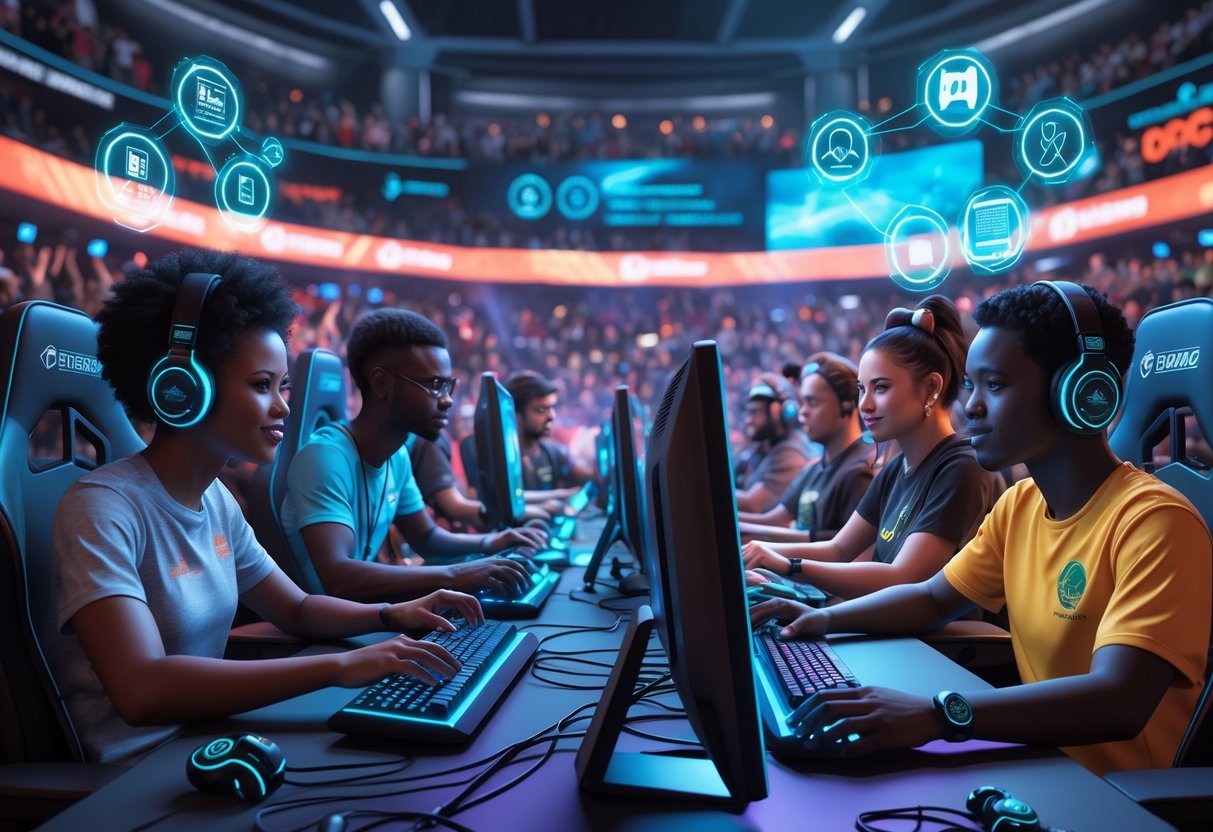
The African esports ecosystem is opening up all kinds of career options beyond just playing games. From broadcasting and content creation to designing games and running events, there’s a lot more out there than most people think.
Shoutcasting and Content Creation
Shoutcasting means commentating live esports matches for viewers. African gamers can start by streaming local tournaments on YouTube or Twitch.
Plenty of successful African shoutcasters started out covering regional FIFA or League of Legends matches. Honestly, it’s worth practicing commentary during your own games to get comfortable.
Equipment needed:
- A decent microphone (£50-150)
- Free streaming software
- A stable internet connection
Content creators make money from sponsorships, donations, and platform monetization. South African creators have built big audiences by focusing on the mobile games everyone plays.
Quick tip: Try making highlight reels of local tournaments. It’s a great way to build your portfolio and support your community.
Game Development and Design
Africa’s gaming industry really needs local developers who get what regional players want. Mobile games rule the market, so devs focusing on accessible gaming have a real shot.
Studios in Nigeria and South Africa are making games that reflect African culture and stories. Most start small but sometimes go on to international success.
Essential skills:
- Programming languages (Python, C#)
- Game engines like Unity or Unreal
- Art and design tools
A lot of devs start with free tools and online tutorials. The Esports Academy runs training programs tailored for African developers.
Heads up: Be wary of pricey courses that promise instant results. It’s smarter to build a portfolio with personal projects first.
Event Management and Entrepreneurship
Esports tournaments need organisers who can handle logistics, sponsors, and technical setups. In Africa, many gamers move into event management after their competitive days.
Local tournaments need people to coordinate venues, rent equipment, and manage prize pools. Some of the best events started with just 16 players and eventually became major regional competitions.
Key responsibilities:
- Book and set up venues
- Build and maintain sponsor relationships
- Coordinate technical equipment
- Produce live broadcasts
Gaming cafés and esports arenas are turning into real business opportunities now. Cities like Lagos and Johannesburg keep seeing new investments in gaming facilities.
Next step: Try volunteering at a local tournament to get your feet wet before launching your own event.
Societal Perceptions and Cultural Impact
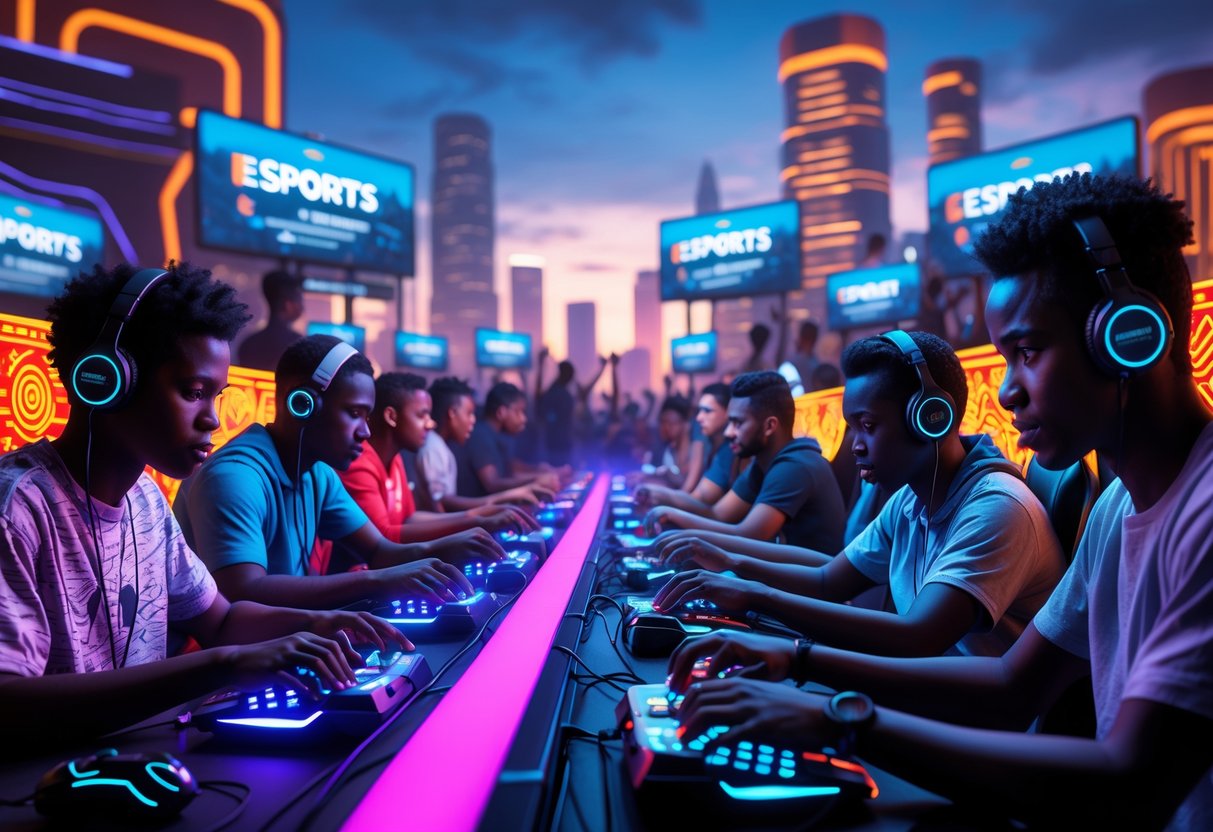
African societies are starting to see gaming careers and cultural expression in a new light. Games with African storylines are building pride and pushing back against old ideas about professional gaming.
Challenging Career Stereotypes
Many African communities still see gaming as a waste of time, not a real career. Parents usually push kids toward traditional jobs like medicine or law.
But this attitude is changing—slowly. Successful African gamers are earning real money now. Prize winnings and sponsorships show that esports can actually pay the bills.
Educational barriers still get in the way. Most African universities don’t offer game development programs. Young developers usually have to teach themselves or take online courses.
Events like Africacomicade’s Gamathon are starting to shift these perceptions. Their three-day event produced over 20 games and handed out cash prizes to the winners. They even gave 15 developers access to professional courses.
Community leaders are beginning to notice esports’ economic potential. Some governments are starting to support gaming, seeing it as a way to create jobs and boost tech innovation.
Gaming as New Cultural Expression
African developers are making games that celebrate local culture and stories. These titles move away from Western narratives and highlight authentic African experiences.
Popular examples include:
- Mobile racing games with Ghana taxi cabs and Lagos tricycles
- “Aurion: Legacy of Kori-Odan,” inspired by African mythology
- “Kukulu,” an endless runner about chasing chickens for grandma’s dinner
These games give African players a chance to see themselves in a positive light. People here are honestly tired of all the negative stories about the continent.
Game developers have started acting as cultural ambassadors. They use interactive media to share local traditions, languages, and values with the world.
Gaming expert James Connolly once said, “Cultural representation in games creates stronger emotional connections between players and the medium.”
The demand for African-made games keeps growing. Players want content that feels real to them—not just more foreign perspectives.
Key Challenges and Future Outlook
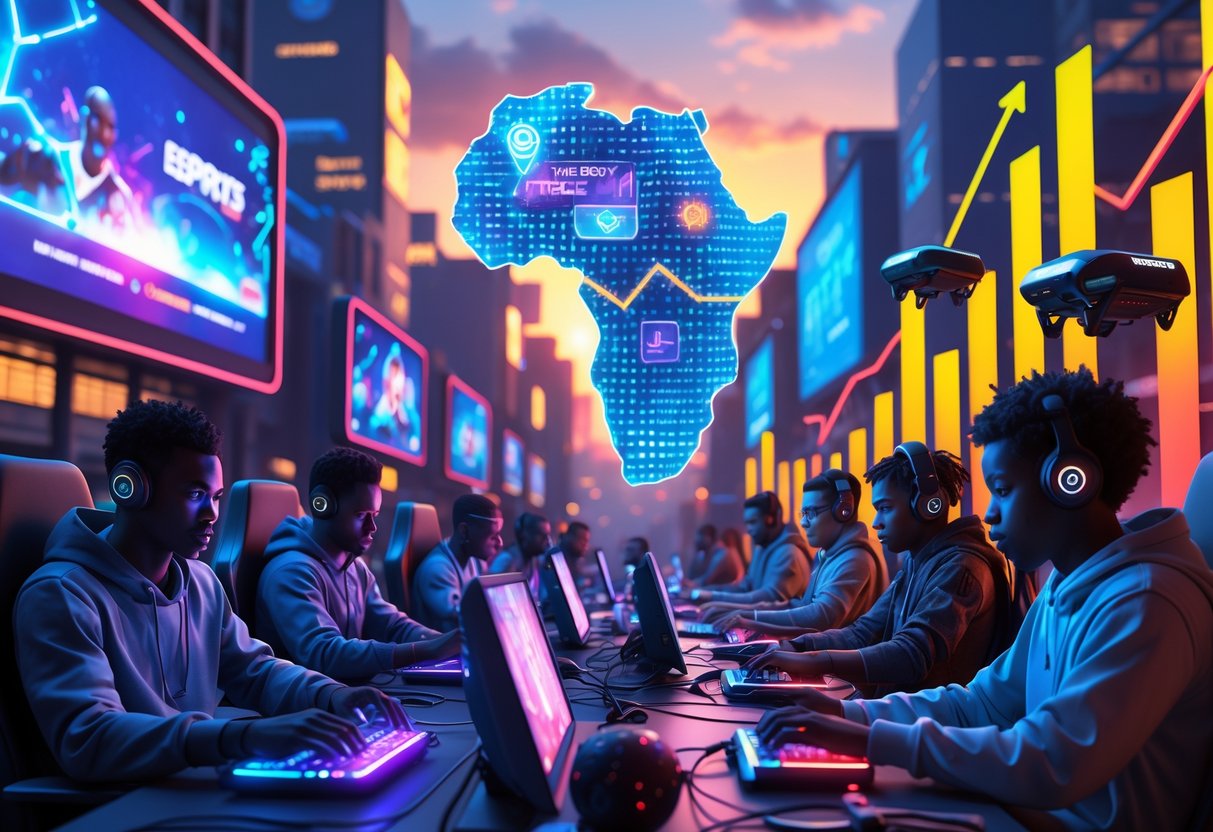
Africa’s esports industry faces big hurdles with infrastructure and funding. Still, mobile connectivity is improving, and smart investments could set up sustainable growth.
Infrastructure Hurdles
Internet connectivity is Africa’s toughest challenge. Many areas still don’t have reliable broadband for competitive gaming. Rural regions deal with high data costs that make regular gaming tough.
Mobile networks are catching up faster than traditional broadband. Kenya and Nigeria, for example, are rolling out 4G coverage quickly. Still, latency issues mess with competitive play.
Gaming centres are helping for now. Places like Lagos and Cape Town have gaming cafés with decent connections. Players go there for tournaments when home internet just doesn’t cut it.
Power supply is another headache. Outages mess up training and tournaments. Backup generators are just too expensive for most venues.
Funding and Investment Gaps
Local sponsorship is still pretty limited. African brands are just beginning to see the value in esports. Most prize pools are small compared to the rest of the world.
International investors are starting to pay attention. Companies see Africa’s young population and growing mobile use. But regulatory uncertainty still makes them hesitate.
Player development doesn’t have enough funding. Few organisations pay salaries or offer training. Most talented players can’t afford to go full-time without other work.
Government support is a mixed bag. South Africa is ahead, with some esports recognition. Other countries still treat gaming as just entertainment.
Steps Toward Sustainable Growth
Mobile-first gaming makes sense for Africa. Games like PUBG Mobile and Free Fire fit local devices and budgets. You don’t need pricey hardware like with PC esports.
Educational programs are popping up fast. Universities in South Africa and Nigeria now offer gaming courses. These programs train broadcasters, analysts, and event managers.
Regional tournaments are gaining steam. Events like the African Esports Championship give players local ways to compete. Prize pools are getting bigger as brands get involved.
Global partnerships are speeding up development. The International Esports Federation now counts several African members. These links bring in training and funding that weren’t there before.
Frequently Asked Questions
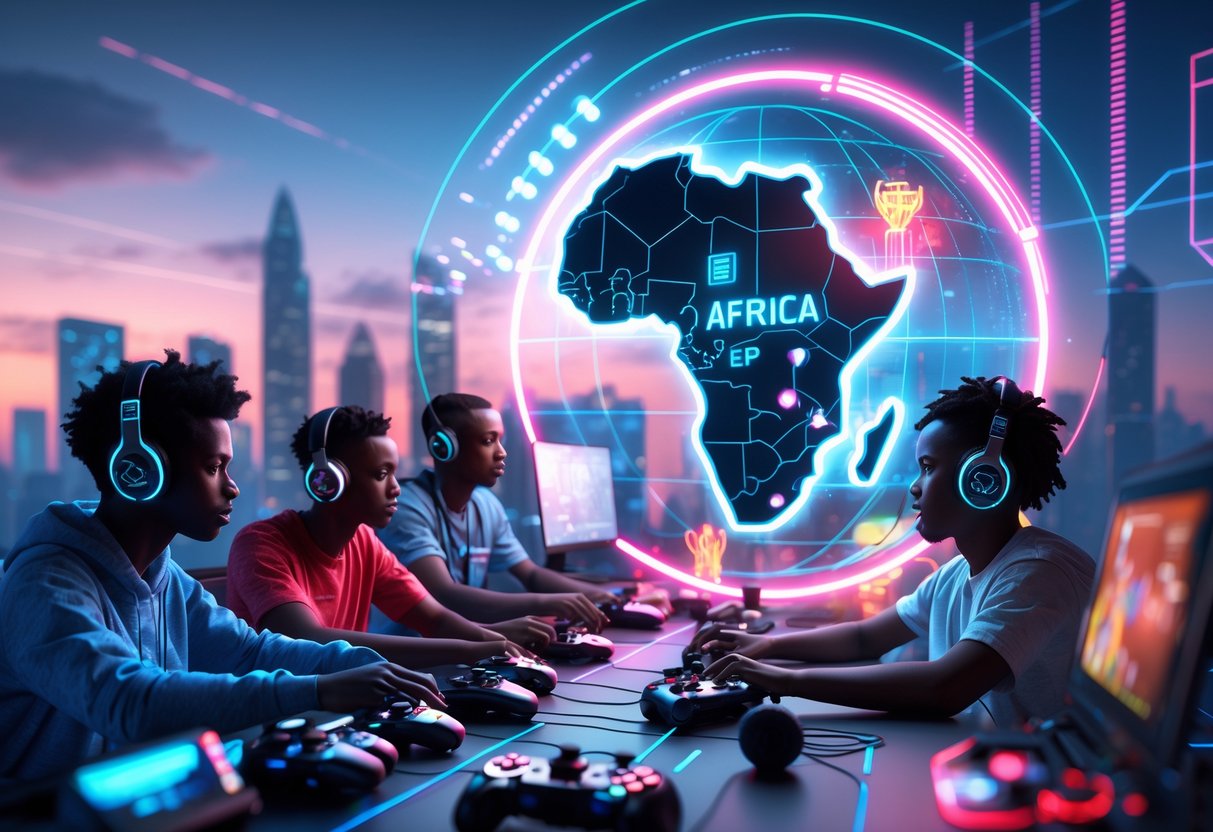
Africa’s esports boom comes from its young population, better internet access, and a surge in mobile gaming. South Africa, Nigeria, and Kenya are leading the way, even with the infrastructure struggles.
What are the primary factors driving the expansion of esports in African countries?
Africa’s huge youth population fuels esports growth. Young people here see gaming as both fun and a possible career.
Better internet access across the continent makes competitive gaming more possible. Many cities now have connections that support online tournaments.
Gaming lounges and cafés give players affordable access to good equipment. You don’t need to own a fancy gaming PC or console to compete.
Smartphone ownership is rising, too. Mobile games like PUBG and Free Fire only need basic devices, not expensive gear.
How is the growth of mobile gaming impacting esports across the continent?
Mobile gaming opens up esports for more Africans who can’t afford PCs or consoles. Smartphones are way cheaper than traditional setups.
Popular mobile esports games like FIFA Mobile and PUBG Mobile have huge followings. These games work well on the mid-range phones that most people already use.
Mobile gaming tournaments are popping up everywhere. Local sponsors back these events because they reach bigger audiences.
Data costs are still an issue, but cheaper packages and better networks are slowly making things easier.
Which African nations are leading in the esports industry, and what are they doing differently?
South Africa leads with established tournaments and local sponsors. The country’s Dota 2 teams even compete internationally.
Nigeria uses its big population and tech scene to host major gaming events. There’s a strong mobile gaming community there.
Kenya stands out in FIFA esports. A Kenyan FIFA player recently took home a regional championship, which is a big deal.
These countries invest in gaming infrastructure and support local tournaments. Their internet is just better than in most other African nations.
How are local companies, like Carry1st, contributing to the esports ecosystem?
Local companies make games that speak to African players. They add African themes, languages, and cultural touches.
They also help fund and sponsor local tournaments. Their money helps create prize pools and pro opportunities.
Some companies partner with international developers. These deals bring global games to Africa, fully localised.
They support streaming and content creation, too. Local firms sponsor African streamers and help them grow on Twitch and YouTube.
What are some of the biggest challenges that the African esports community is facing?
Internet connections are still patchy in many regions. Bad connections mean high ping, which ruins competitive play.
Gaming equipment just costs too much for a lot of people. PCs, consoles, and accessories are expensive compared to average incomes.
Social acceptance of gaming as a real career is still developing. Many parents and communities don’t get the professional side of it.
Limited local servers cause connection headaches. Players often have to use European or Middle Eastern servers, which means lousy latency.
In what ways are global esports entities contributing to the development of the industry in Africa?
International tournament organizers now create African qualifying events. Competitions like the Africa Esports Championship open up real pathways to global tournaments.
Global gaming companies have started investing in African server infrastructure. With better local servers, players get lower ping and a smoother competitive gaming experience.
Major esports brands put their support behind African teams and players. That funding gives talented players a shot at competing on the international stage.
Streaming platforms like Twitch back African content creators. They offer monetization opportunities and help African gamers connect with global audiences.

